Metztli Reiser4: 'How can the [VirtualBox] guest additions work if they are no native OS/2 progs[?]'
Recently I came across the question of the title and the associated issue: how to enable the VirtualBox Guest Additions for OS/2. Indeed, this is an old issue which surviving savvy OS/2ers have managed to achieve. Notwithstanding, as is usually the case, the procedure is nowhere to be found -- probably due to OS/2ers proprietary mindset since most have migrated to the allegedly corrupt ![]() oligarch Bill Gate's mediocre, compromised, virus-like software. Spearheaded by the mundane household name, windows, Microsoft is imposed on US' vassal governments, like that of the pusillanimous New Spain, aka, 'Mexico', and Zio- Nazi Ukraine's1.
oligarch Bill Gate's mediocre, compromised, virus-like software. Spearheaded by the mundane household name, windows, Microsoft is imposed on US' vassal governments, like that of the pusillanimous New Spain, aka, 'Mexico', and Zio- Nazi Ukraine's1.
Alas, VirtualBox Guest Additions are proprietary software as they are released as VirtualBox Personal Use and Evaluation License (PUEL); incidentally, the acronym closely resembles PUKE, just pointing out the obvious. Just for the record, I do not need such PUKE..., er, PUEL, since under my Linux -based Metztli Reiser4 as in all versions of OS/2 2.0, 2.1x, Warp 3, and Warp 4, I can just generate on the fly an ISO image from the command prompt to transfer files from Linux to OS/2. I can, alternatively, mount a given OS/2 version as a virtual disk under a guest Metztli Reiser4 and transfer data (assuming, of course, the OS/2 file system is not hpfs386 ![]() . Also, allegedly VirtualBox Guest additions depend on a KERNEL EXECUTION ENVIRONMENT (KEE) extension introduced only in the kernels of WSEB and a certain late fixpak for OS/2 Warp Merlin.
. Also, allegedly VirtualBox Guest additions depend on a KERNEL EXECUTION ENVIRONMENT (KEE) extension introduced only in the kernels of WSEB and a certain late fixpak for OS/2 Warp Merlin.
For instance, here is what happens when the VirtualBox Guest additions are enabled for a fixpaked OS/2 Warp 3 Connect running the last available kernel:
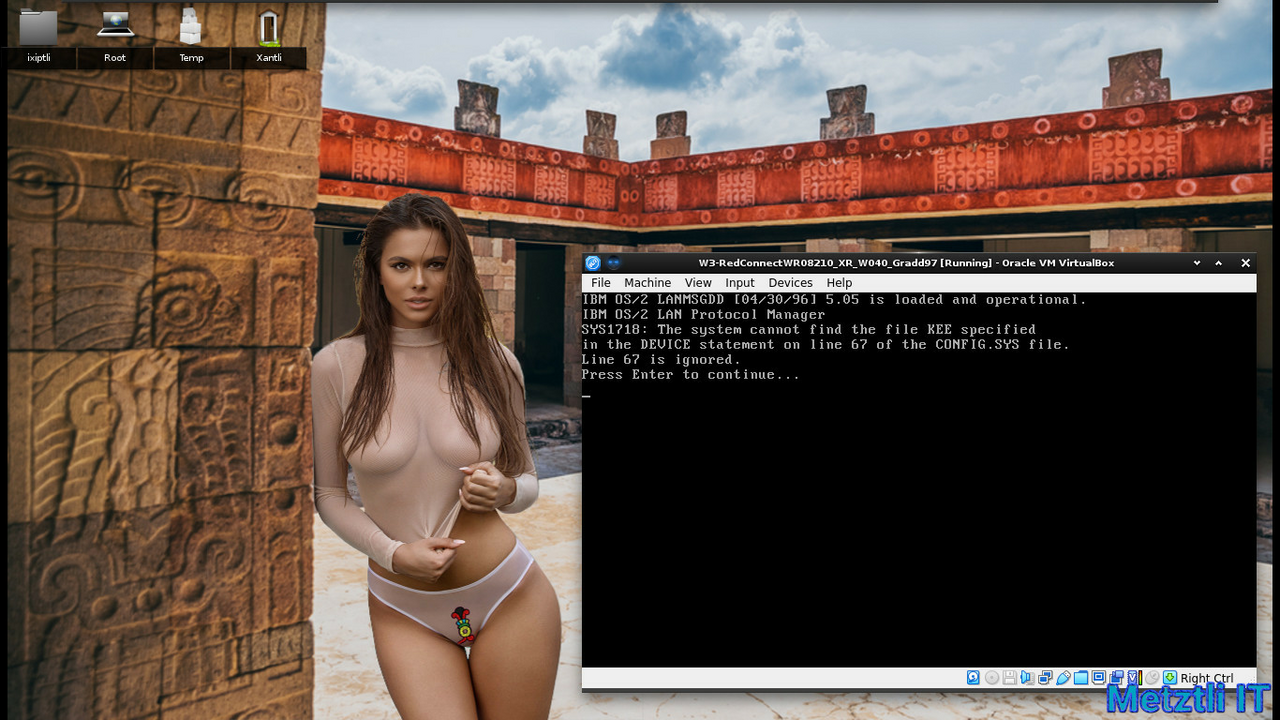
Accordingly, installing the VirtualBox Guest Additions was more an act of technological curiosity more than anything else -- as I strive to stay away from cave proprietary development.
Lowdown
If you are going to build the most recent VirtualBox 6.1.34/36 under Debian Buster/Bullseye and/or Amatlocuilin, i.e., 'Bookworm', Debian Linux, you will need to install the following packages -- as root or wielding root privilege with sudo :
Shell
dpkg --add-architecture i386 |
Shell
apt-get install lib32z1 lib32ncurses6 libc6-dev-i386 lib32gcc-s1 gcc-multilib lib32stdc++6 g++-multilib gcc g++ bcc iasl xsltproc uuid-dev zlib1g-dev libidl-dev libsdl1.2-dev libxcursor-dev libasound2-dev libstdc++5 libpulse-dev libxml2-dev libxslt1-dev python-dev libcap-dev libxmu-dev mesa-common-dev libglu1-mesa-dev libpam0g-dev libxrandr-dev libxinerama-dev makeself libdevmapper-dev default-jdk texlive-latex-base texlive-latex-extra texlive-latex-recommended texlive-fonts-extra texlive-fonts-recommended genisoimage libvpx-dev libvncserver-dev libssl-dev libqt5x11extras5-dev qttools5-dev-tools make libopus-dev liblzf-dev gsoap jaxws docbook-xsl docbook-xsl-ns python3-sphinx yasm libtpms-dev qttools5-dev |
(If on Debian Bookworm 12 and VirtualBox-7.0.20, replace python-dev above with python-dev-is-python3 and include libpython3.10-dev and/or libpython3.11-dev libgsoap-dev as well as libcurl4-openssl-dev and glslang-tools -- as this latter package provides glslangValidator)
Also, if building VirtualBox 7.0.20 on Debian Bookworm AMD64 you experience an error with output containing a line similar to:
kmk: *** No rule to make target '/usr/lib/x86_64-linux-gnu/libQt5Help.so', needed by '/usr/src/build/VirtualBox-7.0.20/out/linux.amd64/release/obj/UICommon/UICommon.so'. Stop.
then qttools5-dev must be missing -- even if the configure.log file shows every dependency to build VirtualBox 7.0.20 is fulfilled.
If building VirtualBox 7.1.0 on Debian 12 Amatlocuilin, i.e., 'Bookworm', you will need the packages:
qt6-5compat-dev qt6-base-dev qt6-base-dev-tools qt6-tools-dev qt6-scxml-dev
Additionally, if building VirtualBox 7.2.2 on Debian 13 Trixie, and you get a similar error as:
xyz/build/VirtualBox-7.2.2/src/VBox/Runtime/generic/http-curl.cpp:2097:43:
invalid conversion from ‘long int’ to ‘curl_proxytype’
you will need a patch developed by Debian and being used by other distros, too:
new-curl.patch to be applied to
src/VBox/Runtime/generic/http-curl.cpp
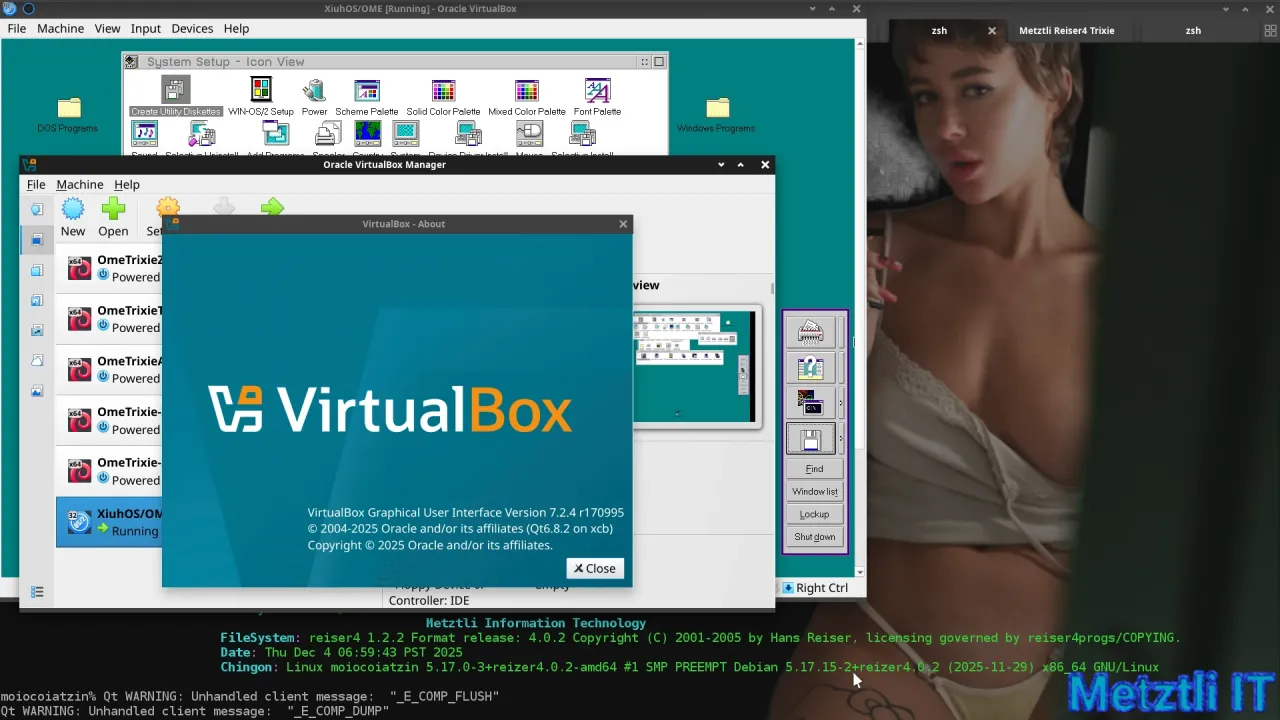
and the higher version upstream package
qt6-base-dev_6.8.2+dfsg-9_amd64.deb
which contains an extra file:
/usr/include/x86_64-linux-gnu/qt6/QtCore/qglobal.h
otherwise, your build from source will fail, halting when referencing:
#include <QtGlobal>
Please, do add to the package dependencies previously elaborated, if needed, i.e., if not on a Metztli Reiser4:
Shell
apt-get install linux-kernel-headers |
We can then download the OSE VirtualBox most recent source release and extension pack:
Shell
wget -P ~/Downloads https://download.virtualbox.org/virtualbox/6.1.36/VirtualBox-6.1.36.tar.bz2 https://download.virtualbox.org/virtualbox/6.1.36/Oracle_VM_VirtualBox_Extension_Pack-6.1.36-152435.vbox-extpack https://download.virtualbox.org/virtualbox/6.1.36/SHA256SUMS |
And verify their integrity:
Shell
for i in $(sha256sum ~/Downloads/Oracle_VM_VirtualBox_Extension_Pack-6.1.36-152435.vbox-extpack ~/Downloads/VirtualBox-6.1.36.tar.bz2 | cut -d' ' -f1); do grep $i ~/Downloads/SHA256SUMS; done |
Note that the sha256sum is currently the same for Oracle_VM_VirtualBox_Extension_Pack-6.1.36-152435.vbox-extpack (fetched) as for Oracle_VM_VirtualBox_Extension_Pack-6.1.36.vbox-extpack which only exists in SHA256SUMS file.
Once at the directory location selected to untar our VirtualBox source archive, we do:
Shell
tar -xf ~/Downloads/VirtualBox-6.1.36.tar.bz2 |
and change into VirtualBox-6.1.36:
Shell
cd VirtualBox-6.1.36 |
We also bring with us the fetched extension pack:
Shell
cp -iv ~/Downloads/Oracle_VM_VirtualBox_Extension_Pack-6.1.36-152435.vbox-extpack . |
We configure our source:
Shell
./configure --disable-docs --disable-hardening --enable-vde --enable-vnc |
(please, type ./configure --help to see for more information)
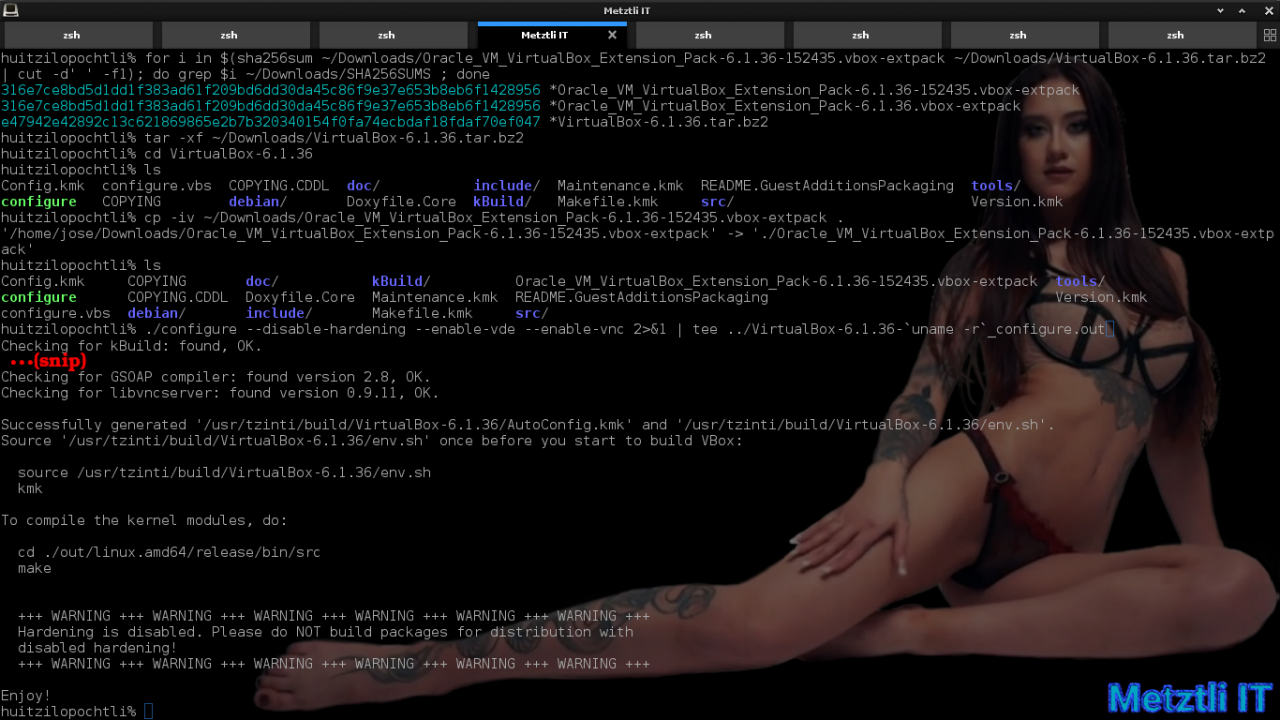
We follow the guidelines at the end of the output (in above snapshot) after a successful VirtualBox source configuration:
Shell
source env.sh | |
kmk |
After a fraction of an hour kmk ends without errors:
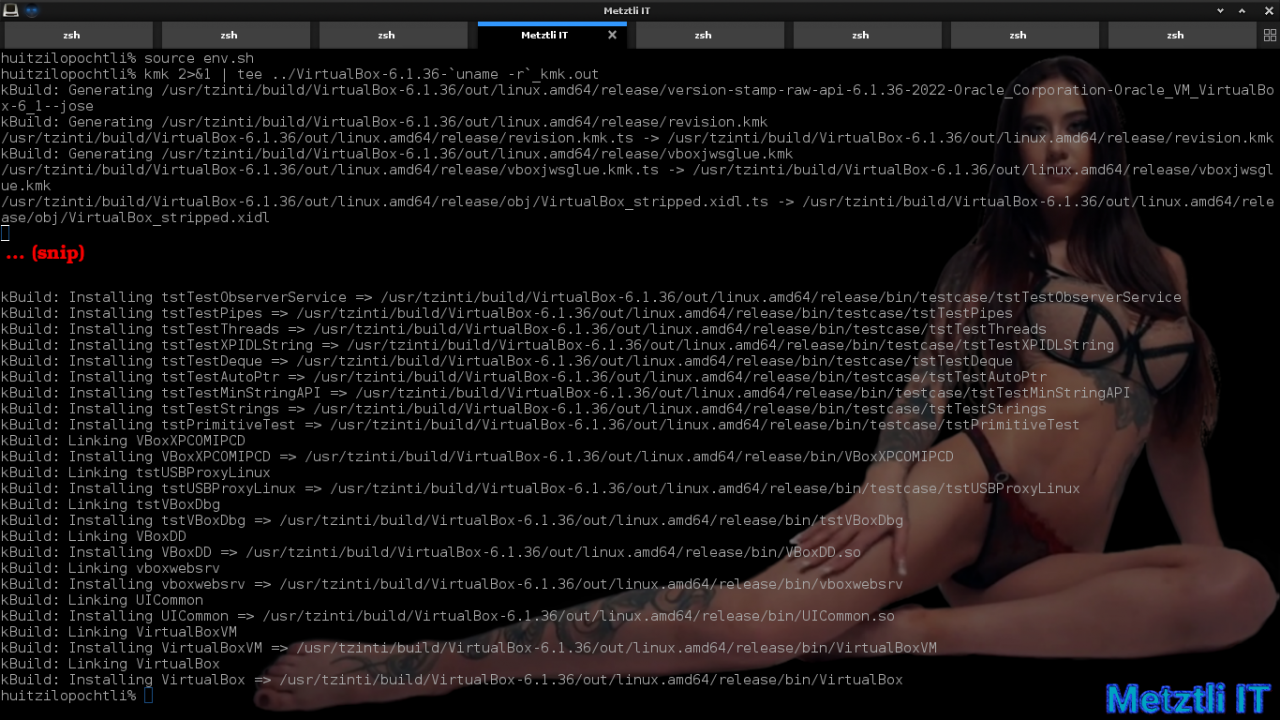
We peek to find out what VirtualBox modules will be built by observing their directory name:
Shell
ls out/linux.amd64/release/bin/src |
then we start the make procedure -- specifying -C option to instruct make to change directory first:
Shell
make -C out/linux.amd64/release/bin/src |
![Metztli Reiser4: 'How can the [VirtualBox] guest additions work if they are no native OS/2 progs[?]'](https://metztli.blog/media/blogs/ixiptli/Tlilticohuatl/.evocache/make_-c_virtualbox-src-path.png/fit-1280x720.png?mtime=1658309795)
After the modules build completes, we again peek as in command 11 above. We should see the freshly minted modules inheriting their source directory name but concatenating a .ko file extension. We acquire root privilege with su and proceed to install the VirtualBox modules:
Shell
make -C out/linux.amd64/release/bin/src install |
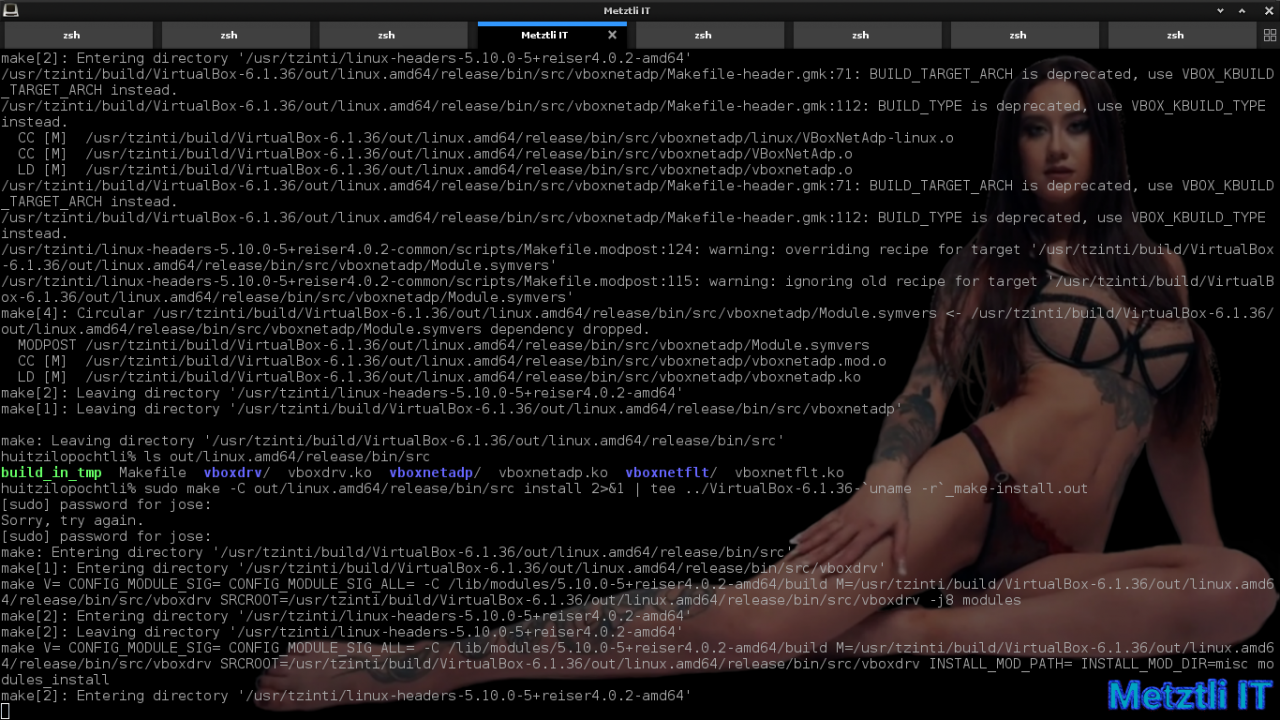
We can verify that the VirtualBox 6.1.36 modules were indeed installed for our reiser4 kernel:
Shell
ls /lib/modules/`uname -r`/misc |

Acquiring root privilege with su and/or as root in Debian -based Metztli Reiser4 we enable (load) the modules:
Shell
depmod -a | |
modprobe vboxdrv | |
modprobe vboxnetflt | |
modprobe vboxnetadp | |
chgrp [user group name] /dev/vboxdrv | |
chmod g+rw /dev/vboxdrv |
Now as a normal user, i.e., no root privilege, we set the path to our VirtualBox 6.1.36 binary:
Shell
PATH=/path/to/our/VirtualBox-6.1.36/out/linux.amd64/release/bin:$PATH |
We Verify that, in effect, we can call to execute our VirtualBox binary:
Shell
which VirtualBox | |
VirtualBox & |
Subsequently, the VirtualBox 6.1.36 r152435 type 2 hypervisor will start, containing all the previous virtual machines we have created, if at all:
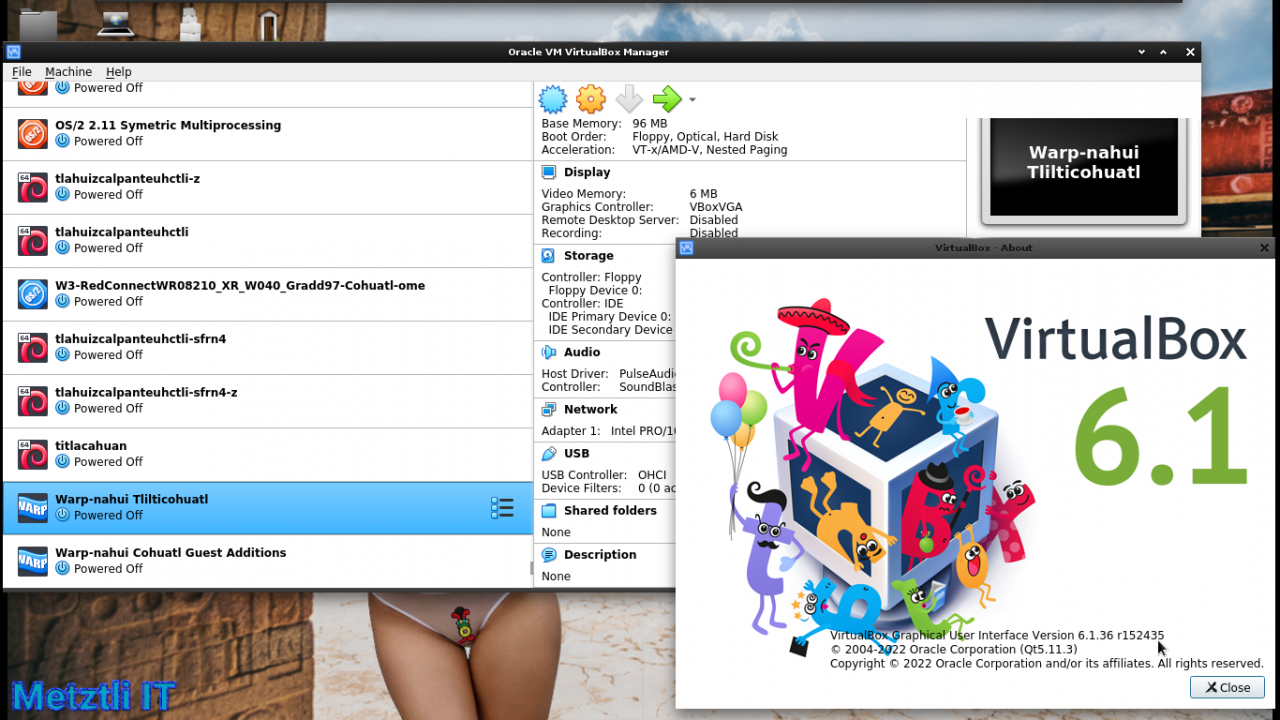
Helpful OS/2 Warp 4 Utility and How to Enable It.
grep from grep_3-4-1.zip at Netlabs
depends on:
libcn0.dll from libc-0_1_7-1_oc00.zip
libcx0.dll from libcx-0_4_1-1_oc00.zip
WARNING: libcx0.dll from libcx-0_7_2-1_oc00.zip did not work;
it yields: A non-recoverable error occurred. The process ended.
intl8.dll from gettext-0_19_8_1-3_oc00.zip
gcc1.dll from gcc-9_2_0-5_oc00.zip
gcc444.dll from gcc-9_2_0-5_oc00.zip
pcre8.dll from pcre-8_45-1_oc00_1.zip
libc063.dll from libc-0_6_6-40_oc00.zip
libc066.dll from libc-0_6_6-40_oc00.zip
pthr01.dll from pthread-20190130-23_oc00.zip
urpo.dll from urpo-20160630-12_oc00.zip
Extracting those DLLs and subsequently placing them under your /OS2/DLL/ directory will enable the grep utility where, of course, grep is an executable and should be placed under /OS2/ ![]() ; then you can invoke grep from any location in your command line.
; then you can invoke grep from any location in your command line.
1
Microsoft is 'encroaching on the sovereignty of other states', besides Ukraine:
Microsoft announces a $1.1 billion investment plan to drive digital transformation in country including its first cloud datacenter region